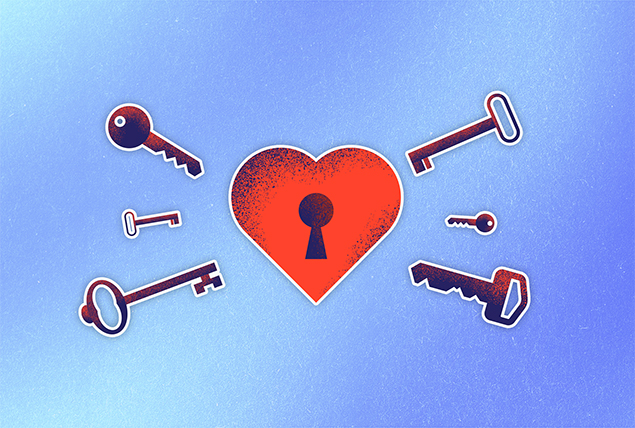Help! My Partner Wants to Open Our Relationship

Key Points
- Research suggests a significant portion of Americans are engaged in or interested in open relationships.
- Experts say it's important to have the right reasons for opening a relationship.
- Couples should assess the overall health of the monogamous partnership and understand one's own motivations and those of their partner.
Editor's note: Some sources requested their full names and locations not be used.
Kit was attending graduate school in a different city when their partner of two years suggested they open their relationship.
"Long-distance was physically challenging for me in terms of not having an outlet," said Kit, a 27-year-old in Austin who uses the pronouns they/them/theirs.
Their partner, recognizing Kit's restlessness, proposed they look outside their relationship to meet their physical needs.
"It felt very practical," Kit said of their partner's proposal. "It felt vulnerable of her to be like, 'I can't meet this need for you,' but also very practical in terms of, 'Oh well, there's a whole bunch of other people that can meet those needs.'"
Saurabh, a 31-year-old man in Houston, wasn't as amenable when his pansexual partner of two months asked him how he'd feel if she dated women outside of their relationship.
"Is that something you really want?" he asked her.
It was, and the two broke up a few months later after Saurabh moved to Los Angeles.
"I think I also just felt sexually threatened," Saurabh said of the experience. "She wanted to be with other people and that made me feel insecure. Like I'm not good enough, even though I knew it wasn't the case."
Open relationships: An overview
Research published in 2018 estimated about 1 in 9 Americans engage in open relationships or ones that are sexually or romantically nonmonogamous. Sometimes used interchangeably with polyamory, the term "open relationship" can describe a variety of consensually nonmonogamous arrangements, including polyamory, monogamish and swinging.
A 2021 study indicated that 1 in 9 Americans have participated in a form of open relationship in their lives, and as many as 1 in 6 would like to try one.
As life expectancy increases, more people are realizing the precariousness of maintaining lifelong monogamous relationships, according to Tracy Deagan, L.P.C.-S., L.C.S.W., an Austin-based psychotherapist who specializes in nontraditional relationship structures.
"For some couples, it'd be 'foolish' for them to believe that they won't ever find anyone else attractive or want a deeper relationship," she said.
Some people discover an open relationship structure is intuitive and makes more sense than monogamy, according to Manny Kemphues, M.A., a sex-positive, LGBTQ-affirmative therapist in Los Angeles who uses the pronouns they/them/theirs.
"Many people realize that they have the capacity to love more than one person at a time and want to experience that abundance," Kemphues said. "But it's not until later in life that they allow themselves to consider that this could be a valid option."
According to professionals, a monogamous relationship can transition to a nonmonogamous one—but the success of this journey hinges on a couple's reasons for the transition.
Recommended
- The Future of Interactive Sex Toys May Be Open Source: Teledildonics are becoming more intelligent, thanks to groups of DIY developers.
- Boundaries For Friends With Benefits: There are ways to be fair and ethical in nonmonogamous relationships, too.
- Is Your Vagina Too Tight?: Vaginal tightness could be a warning sign of hypertonic pelvic floor.
"In my opinion, the 'right' reason [for a couple to open a relationship] is that they have a sense of themselves as wanting or requiring a broader relational palette," Deagan said. "Unfortunately, most people back into open relationships for the 'wrong' reasons."
She gave the example of somebody becoming attracted to somebody else. Another example is somebody cheating and becoming depressed or in some other way showing they have a need not being met in the relationship.
"I would advise against opening a relationship if the primary motivation is related to dissatisfaction in your existing relationship," Kemphues said. "If there is something that isn't working in your existing relationship, that issue needs to be addressed directly rather than trying to fill the gap with a new person."
Opening up your relationship the 'right' way
Before deciding to open up a relationship, Deagan recommended assessing the overall health of the monogamous partnership.
She recommended asking yourself the following questions:
- Do you and your partner have good self-care skills?
- Do you have the ability to communicate—not only with your partner but with others?
- Do you know your boundaries, and does your partner know theirs?
- Do you have the ability to negotiate and discuss those boundaries?
"If your answers aren't 'Yes' across the board, you should be willing to do a lot of work to get there," Deagan said.
When breaching the topic with your partner, she suggested beginning with something like, "I've been realizing how I like having deeper relationships with others to explore deeper parts of me. Do you ever have those thoughts?"
How Does Your Attachment Style Impact Your Sex Life?: Attachment theory suggests that early bonds with caregivers influence how sexual dynamics can affect your future relationships. Learn how to change your attachment style and have better sex and stronger relationships.
When your partner wants to open your relationship—and you're not sure
If you're on the other end of this conversation—that is, your partner brings up the possibility of opening your relationship and you're not thrilled—Deagan acknowledged this can be hard.
"Most of us go to the worst-case scenario: 'They're tired of me. I'm not meeting their needs. I need to get better or they're going to leave me,'" she said. "Most of us don't have the patience or sense of self to be like, 'OK, that's interesting. Tell me more.'"
Deagan said even though you may feel threatened, you have to hold on to your sense of self. You need to tell yourself you're a beautiful and worthy partner.
Kemphues recommended trying to approach the situation from a place of curiosity.
"Some of the fear and hurt you're feeling might be based on assumptions you're making that aren't true," they said. "The first step is to focus on understanding what your partner is actually wanting and why they want it. If you don't take the time to do this, you might end up experiencing unnecessary hurt based on cultural stories that center monogamy as the only valid or ethical relationship structure."
If you do decide to move forward with opening the relationship, plan to spend at least six months communicating, exploring your values and boundaries, and defining your open relationship structure, according to Deagan.
Kemphues said it can be difficult to predict how the process of transitioning to an open or polyamorous relationship will feel.
"Sometimes people will emotionally prepare for one thing to be challenging and then it's something else that actually ends up being hard," they said. "Sometimes people also feel shame and guilt when feelings like insecurity, anxiety, jealousy or envy come up.
"It's important to make space for your emotions and be kind to yourself as enter this new territory."


















